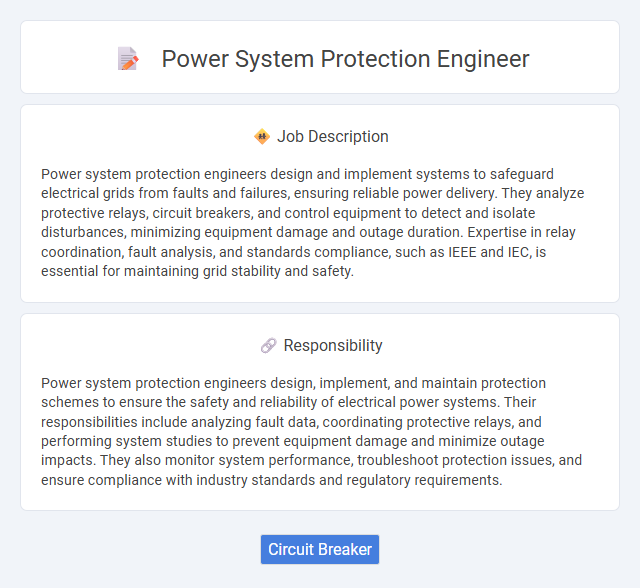
Power system protection engineers design and implement systems to safeguard electrical grids from faults and failures, ensuring reliable power delivery. They analyze protective relays, circuit breakers, and control equipment to detect and isolate disturbances, minimizing equipment damage and outage duration. Expertise in relay coordination, fault analysis, and standards compliance, such as IEEE and IEC, is essential for maintaining grid stability and safety.
Individuals with strong analytical skills and a keen attention to detail are likely suitable for a Power System Protection Engineer role, as it involves assessing complex electrical systems to prevent faults. Those who prefer working in high-pressure environments and have a solid understanding of electrical engineering principles might find this job fitting. Candidates less comfortable with technical problem-solving or prolonged focus on safety protocols may face challenges in adapting to these requirements.
Qualification
A Power System Protection Engineer typically requires a bachelor's degree in electrical engineering or a related field with a strong focus on power systems and electrical protection. Key qualifications include expertise in relay coordination, fault analysis, and protection scheme design, supported by proficiency in software tools such as ETAP, PSCAD, or MATLAB. Certification from professional bodies like IEEE or relevant industry-specific training enhances credibility and demonstrates practical knowledge in power system protection standards and practices.
Responsibility
Power system protection engineers design, implement, and maintain protection schemes to ensure the safety and reliability of electrical power systems. Their responsibilities include analyzing fault data, coordinating protective relays, and performing system studies to prevent equipment damage and minimize outage impacts. They also monitor system performance, troubleshoot protection issues, and ensure compliance with industry standards and regulatory requirements.
Benefit
A Power System Protection Engineer role likely offers benefits such as competitive salary packages, opportunities for career advancement, and exposure to cutting-edge technologies in electrical power systems. There is a probability of gaining hands-on experience with protective relays and fault analysis tools, enhancing technical expertise. Work environments may provide stable employment with potential for involvement in critical infrastructure projects, contributing to professional growth and job satisfaction.
Challenge
Power system protection engineers likely face the challenge of ensuring the reliability and safety of electrical grids amid increasingly complex network configurations and growing integration of renewable energy sources. They may need to design and implement advanced protective relaying schemes to prevent faults and minimize downtime, requiring in-depth knowledge of system behavior and fault analysis. The probability of encountering rapid technological changes and evolving industry standards could demand continuous learning and adaptation in their roles.
Career Advancement
Power system protection engineers specialize in designing and maintaining systems that safeguard electrical grids from faults and failures, ensuring reliability and safety. Career advancement often involves gaining expertise in emerging technologies such as smart grids, relays, and automation, leading to roles like senior engineer, project manager, or protection systems consultant. Certification in industry standards, continued education, and hands-on experience with advanced protection schemes significantly enhance career growth opportunities in this field.
Key Terms
Circuit Breaker
Power system protection engineers specialize in designing and maintaining circuit breakers to ensure the reliability and safety of electrical grids. They analyze fault currents and coordinate protection schemes to isolate faults rapidly, preventing equipment damage and power outages. Expertise in circuit breaker types, such as vacuum, SF6, and oil breakers, is crucial for selecting appropriate solutions for various voltage levels and system configurations.
 kuljobs.com
kuljobs.com